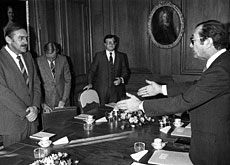Study reveals illegal ties to apartheid regime

Switzerland was involved in more illegal arms dealings with apartheid-era South Africa than was previously thought, research has revealed.
It also found that links between the Swiss secret service and its South African counterpart were long-standing and included the arms trade.
The study, carried out by Bern University historian Peter Hug for the Swiss National Science Foundation, focused on military, arms industry and nuclear relations between the two countries.
Although the report has not yet been published, Hug revealed some of its main findings in an interview in the March edition of the foundation’s Horizonte magazine.
“I was surprised to find out to what extent Swiss industry got round Swiss law and United Nations sanctions,” said Hug.
According to his findings, Switzerland continued illegal exports after the UN arms embargo of 1963, some of which were uncovered during the trial of arms trader Dieter Bührle in 1970.
Bührle was later convicted of making illegal artillery and munitions deliveries to South Africa.
Hidden
“South African documents show… that at that time because of government restrictions on the investigation [into the affair] only around a third of illegal deliveries from the Swiss arms industry between 1963 and 1970 were disclosed,” said Hug.
Hug also found that Swiss arms exports increased massively after the UN arms embargo was enforced in 1977. Switzerland was the only country to contest its application, added the historian.
Swiss businesses also played a part in South Africa’s secret atomic programme, aimed at producing six nuclear bombs using enriched uranium.
One such firm was Sulzer Brothers Ltd, which “on its own information contributed a three-figure million sum to the uranium enrichment [process]”.
Another company, Buchs-based VAT delivered valves, said Hug.
Secret services
The study also examined relations between the Swiss and South African secret services.
According to Hug, links between the two were longer-standing than previously thought and resulted in a series of police-related political and commercial measures.
At the beginning of the 1970s the Swiss in particular initiated an intensive exchange between the two services.
“Denunciations coming from South Africa directly led to the aliens’ police acting against people criticising apartheid in Switzerland,” Hug said.
“Agents were implicated in the arms trade,” he added.
This is not the first time that the Swiss secret service has come under fire for its relations with apartheid-era South Africa.
Criticism
A separate parliamentary committee report released in August 2003 condemned the Swiss secret service for “shadow diplomacy” with its South African counterpart, which ran counter to official policy in Bern.
But it cleared it of involvement in the former South African regime’s chemical weapons programme.
This report came eight months after another probe commissioned by the Swiss defence ministry cleared the intelligence service – and its former chief Peter Regli – of illegal dealings, but criticised the closeness of its relations with the regime.
Overall, Hug summed up Switzerland’s relations with the apartheid regime as “an important support”.
He said that the fact that the human rights movement was in its infancy in Switzerland and the country was outside the UN – it only joined in 2002 – promoted the climate.
“It was astounding to find out to what extent it was considered normal for the majority of economic and social players, as well as for all the [government] departments, to collaborate with South Africa’s apartheid regime,” said Hug.
He added that the government had not been informed of all these activities and certainly not of those linked to the secret service.
Block
The study, which was commissioned by the government, is due to be published after examination by the authorities.
When contacted by swissinfo, Hug said that it could take up to two years to check the manuscript, as happened in another case.
That manuscript eventually only needed minor changes. “I hope that this also happens to me, but I am prepared for difficult negotiations,” Hug told swissinfo.
Hug said that the research process had been fraught with difficulties. In April 2003 the government blocked access to the apartheid-era archives, which named Swiss businesses.
It said the decision was taken to protect Swiss companies facing class-action lawsuits in the United States brought against major multinationals by apartheid victims.
The case, which named banks UBS and Credit Suisse as well as food giant Nestlé, was thrown out in 2004.
Hug told swissinfo that some archives still remained fully closed, but he was allowed to see others under conditions.
The historian said he had also conducted a lot of his research in South Africa and had on occasion had to go through the courts to get access to material.
swissinfo, Isobel Leybold-Johnson
The study reveals that the Swiss arms industry violated Swiss law and a UN arms embargo against South Africa during the 1960s and 70s.
It says that Swiss companies were involved in the apartheid regime’s secret nuclear weapons programme to build nuclear bombs using enriched uranium.
It alleges that the Swiss secret service had long-standing ties with South Africa and was involved in the arms trade.

In compliance with the JTI standards
More: SWI swissinfo.ch certified by the Journalism Trust Initiative












You can find an overview of ongoing debates with our journalists here . Please join us!
If you want to start a conversation about a topic raised in this article or want to report factual errors, email us at english@swissinfo.ch.